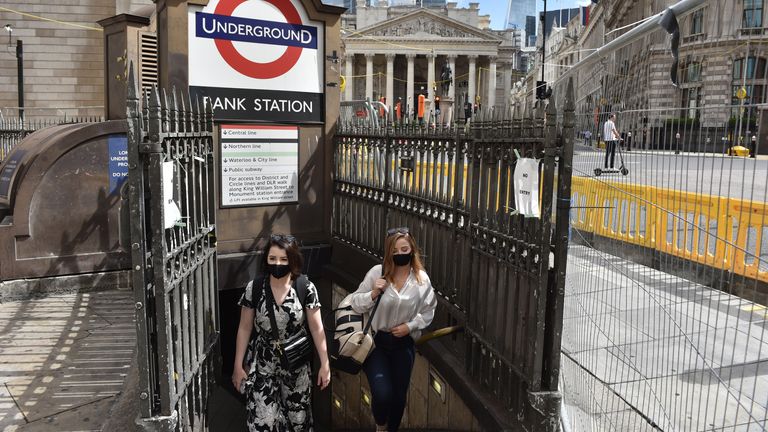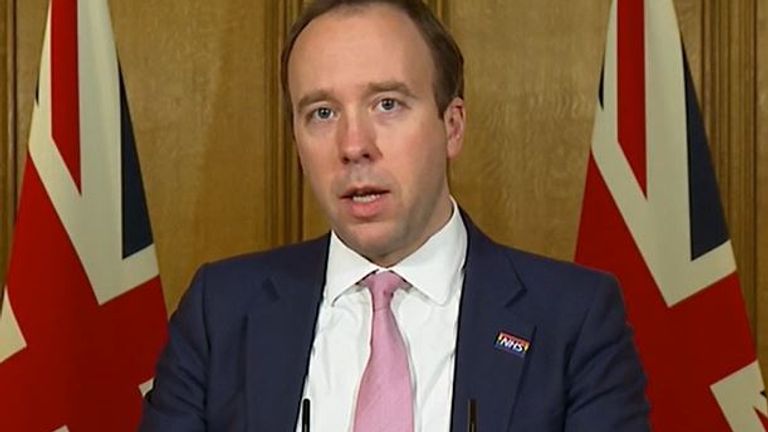COVID-19: ‘Vast majority’ of over-80s should be vaccinated before jabs offered to over-70s, minister says
The “vast majority” of over-80s and care home residents should be vaccinated before local areas move on to giving jabs to lower priority groups, a cabinet minister has told Sky News.
From this week, those aged over 70 and those listed as clinically extremely vulnerable will be invited to receive coronavirus vaccinations.
Live COVID news from UK and around the world
With around 4.2 million people – including more than 50% of over-80s – having now received their first dose of a vaccine, Northern Ireland Secretary Brandon Lewis said there will be a “bit of an overlap” between the first priority and second priority groups.
This is in order to avoid the risk of a “gap and a pause” when moving between the groups, he added.
But Mr Lewis stressed that large numbers of those most at-risk should have received a jab before the vaccine is rolled out further.
“Different local areas will look at their local needs and how they’re moving through that and the decisions they make, but we’re supplying everybody on an equal basis to ensure that people across the country get the vaccinations in good time,” he said.
“We’re very clear that the areas should be going through and treating the people and only moving on to the second cohort when the vast majority of the first cohort have been vaccinated.”
One of Mr Lewis’s cabinet colleagues, Work and Pensions Secretary Therese Coffey, on Monday expressed concern that COVID vaccines were being offered to those aged over 70 ahead of those over 80 who had still yet to be invited to get a jab.
However, she later said a “rapid response” by her local NHS team had left her “assured” that “letters and messages will be going out today to all patients 80+ who had not yet been contacted”.
Subscribe to the Daily podcast on Apple Podcasts, Google Podcasts, Spotify, Spreaker
Despite the “phenomenal” rollout of vaccines so far, Mr Lewis warned the public’s efforts in reducing the spread of COVID still have “a very long way to go”.
The government’s Scientific Advisory Group for Emergencies (SAGE) recently warned that people could become less strict at sticking to coronavirus rules as more of the population is vaccinated.
This could lead to a spike in cases that outweighs the gains made by rolling out the jab, with minutes for SAGE’s meeting last month stating “there is a risk that changes in behaviour could offset the benefits of vaccination, particularly in the early months of vaccine rollout”.
While a COVID jab should prevent sickness, it is still unclear whether the vaccines stop people spreading the infection.
And Mr Lewis warned that “once you have the jab, you’ve still got to follow those restrictions”.
“Not least of all because this is about ensuring we protect everybody across society,” he added.
“These restrictions are in place, as frustrating as they can be for people, they are in place for a reason.”
Mr Lewis said that although COVID cases had begun to “plateau in large chunks of the country… we’ve still got a very long way to go”.
“We’ve got some difficult periods ahead, because of the spread that we have seen over the last few weeks – particularly with this new variant,” he said.
“It’s only as we get a long way through this vaccine process that we can start to look towards something positive.
“We can see the end in sight now, we’ve got to be careful we don’t run too quickly and we still take our time to follow those restrictions and understand why they’re in place.”
At their recent meeting, SAGE scientists said there should be a public awareness campaign with “timely intervention” if vaccinated people begin flouting the rules – believing they are no longer a risk to others, or that older people and family members are now safe.
Health Secretary Matt Hancock urged people not to “blow it now” during a Number 10 news conference on Monday.
The NHS England medical director, Professor Stephen Powis, has also said it’s “absolutely critical” people stick to social distancing and “don’t rely yet on vaccines coming to our rescue”.
The government says it is on course to give the jab to around 15 million people in the highest risk categories by the middle of February.
Around that time, once the vaccines have had time to take effect, ministers will consider whether lockdown measures can be eased.
But the prime minister has warned there will not be an “open sesame” moment when the rules are all suddenly dropped.
Source: Read Full Article




